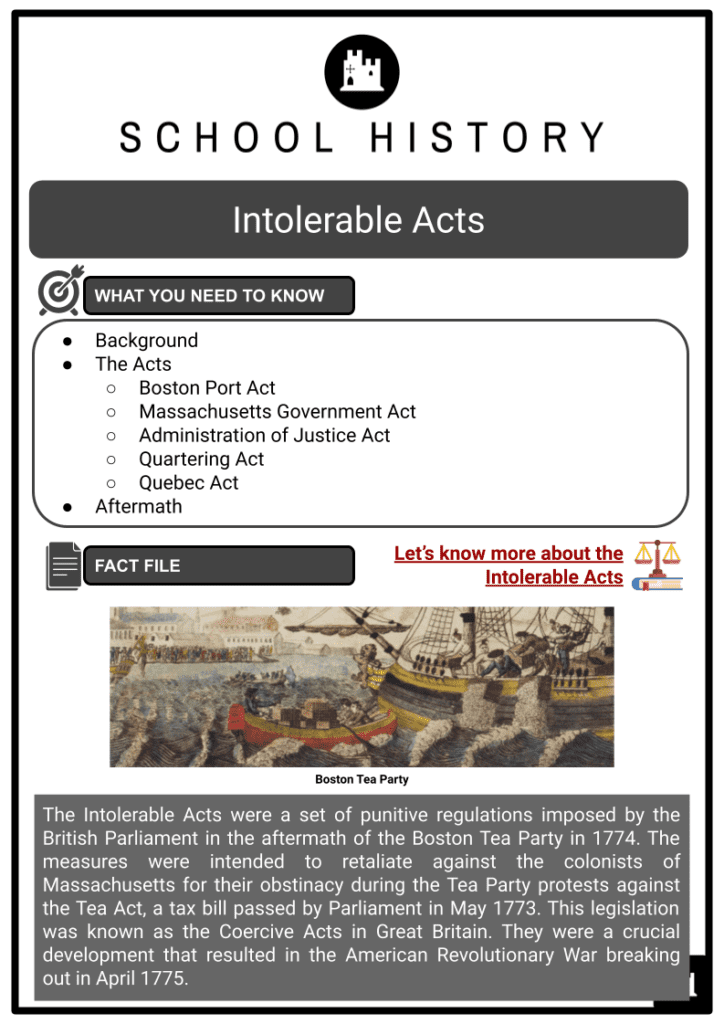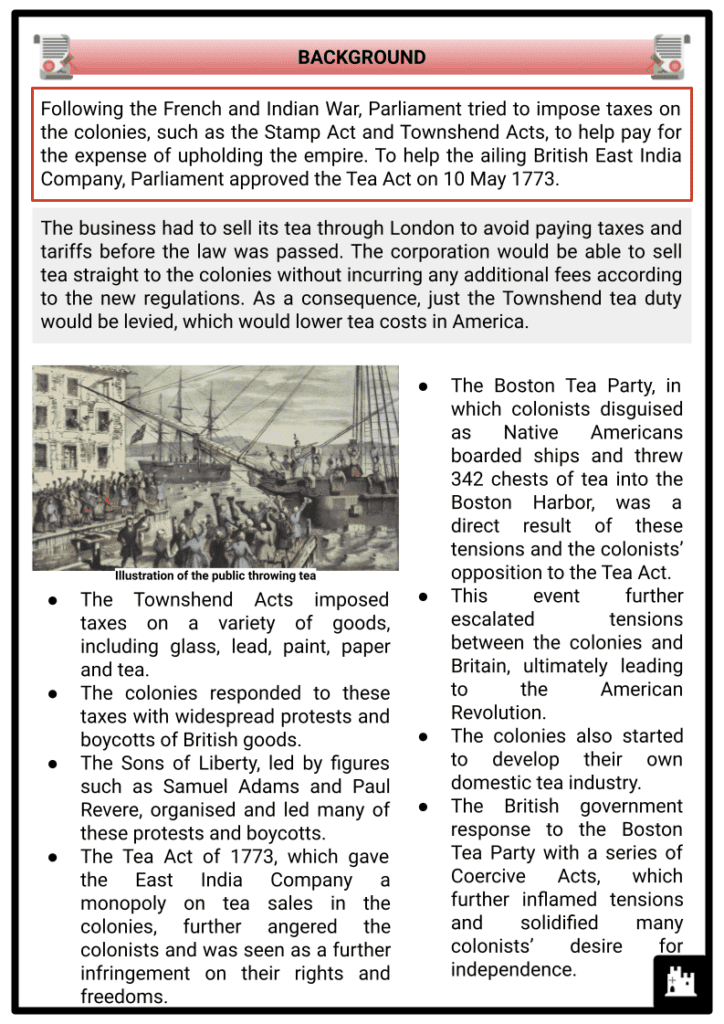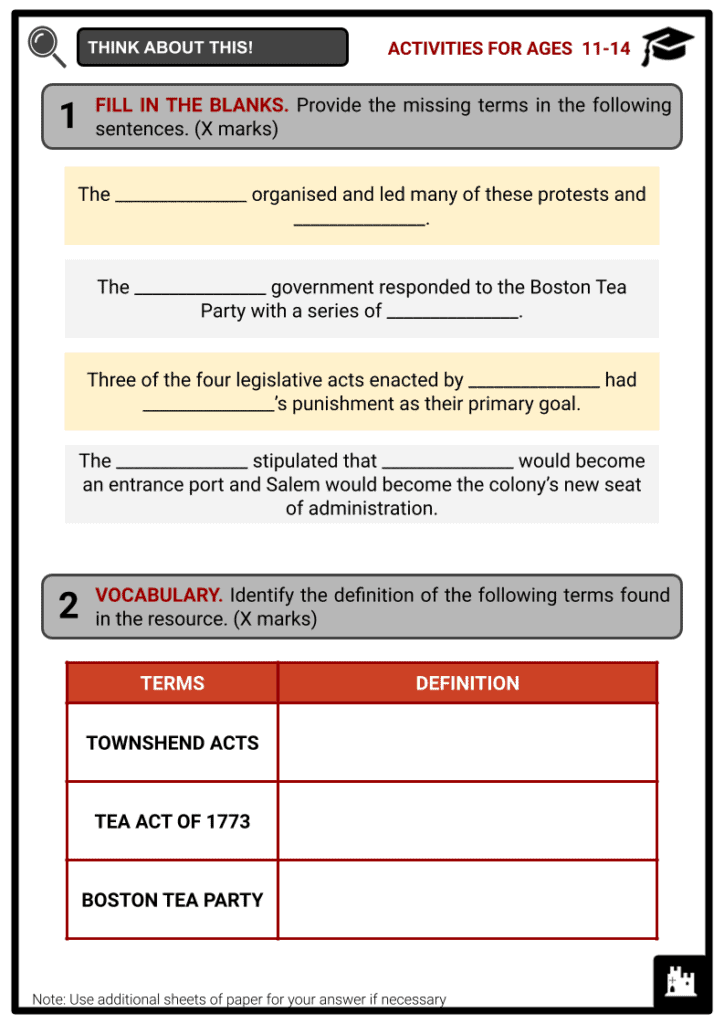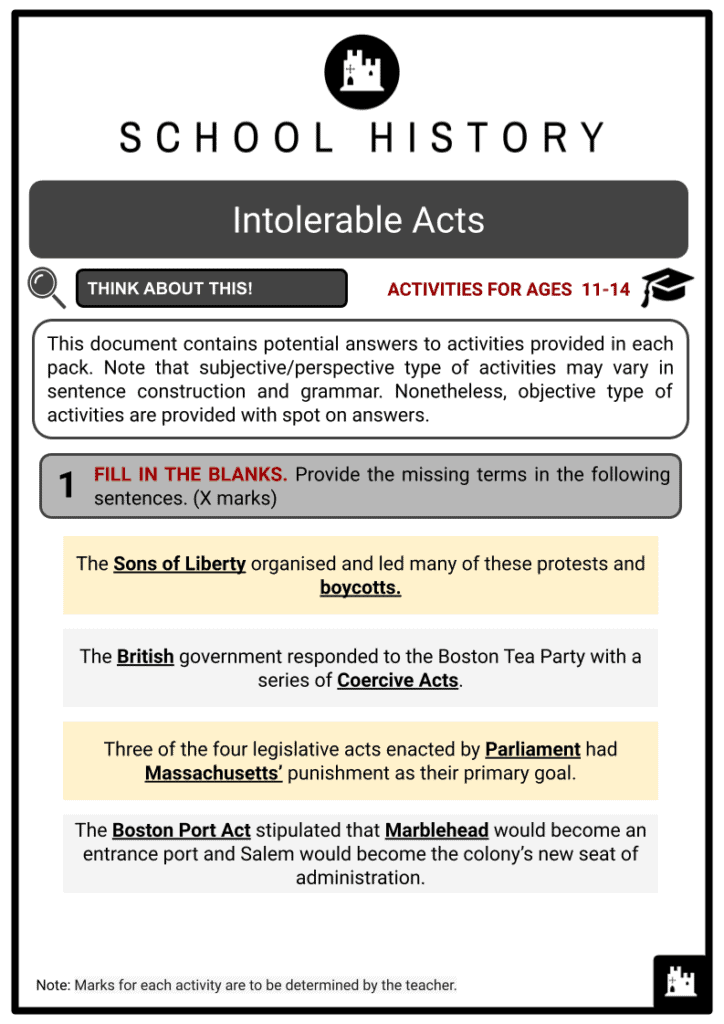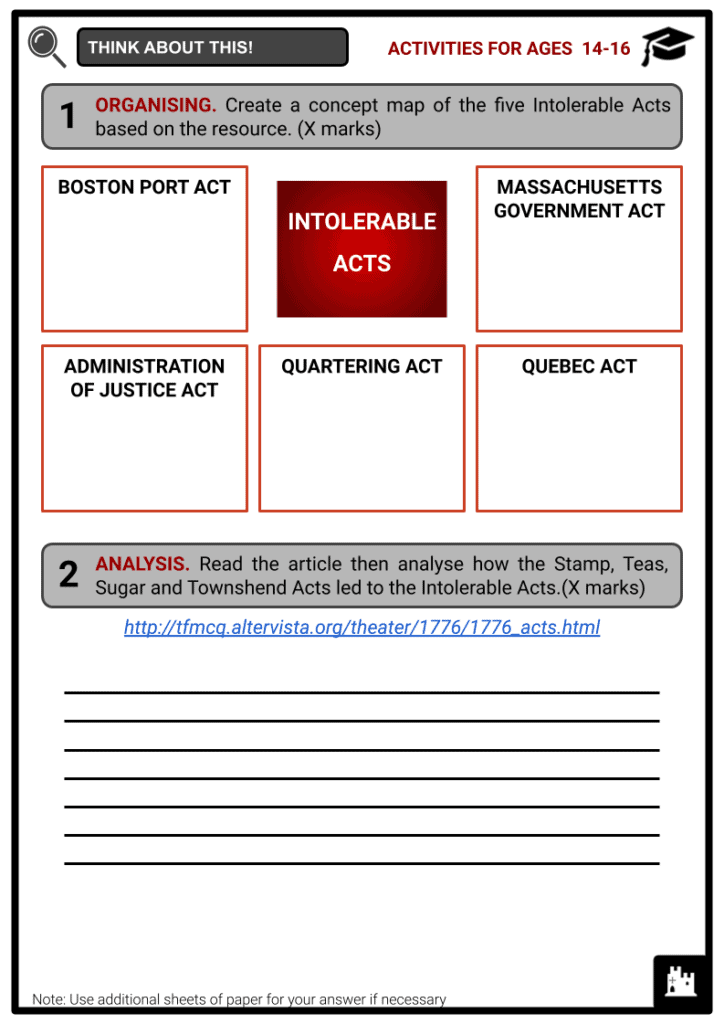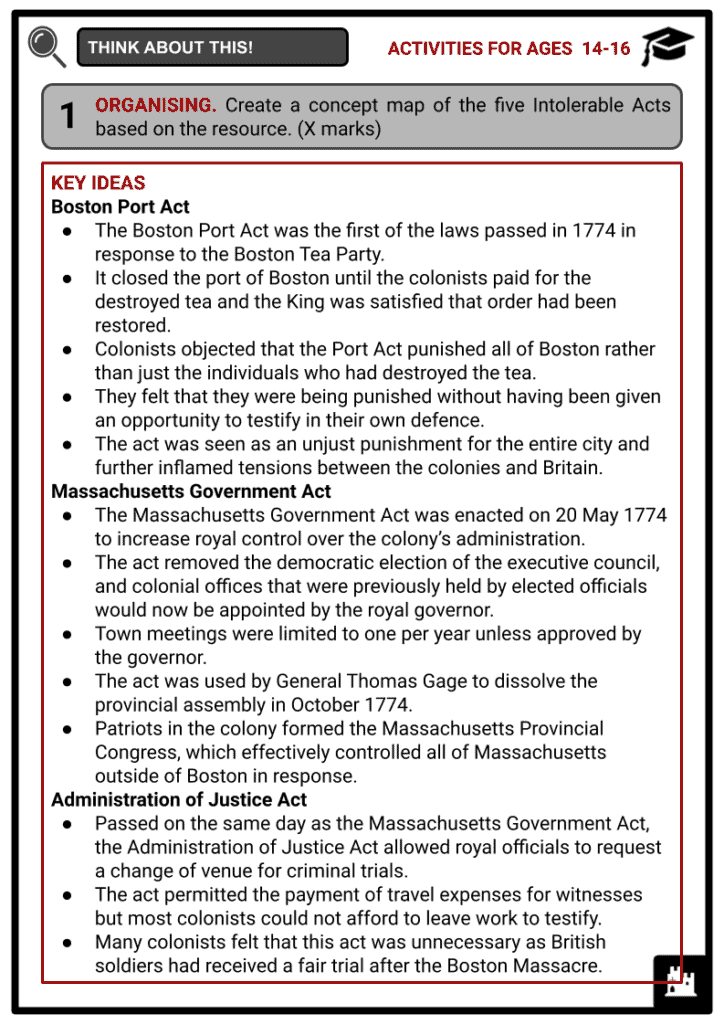Intolerable Acts Worksheets
Do you want to save dozens of hours in time? Get your evenings and weekends back? Be able to teach about the Intolerable Acts to your students?
Our worksheet bundle includes a fact file and printable worksheets and student activities. Perfect for both the classroom and homeschooling!
Summary
- Background
- The Acts
- Boston Port Act
- Massachusetts Government Act
- Administration of Justice Act
- Quartering Act
- Quebec Act
- Aftermath
Key Facts And Information
Let’s know more about the Intolerable Acts!
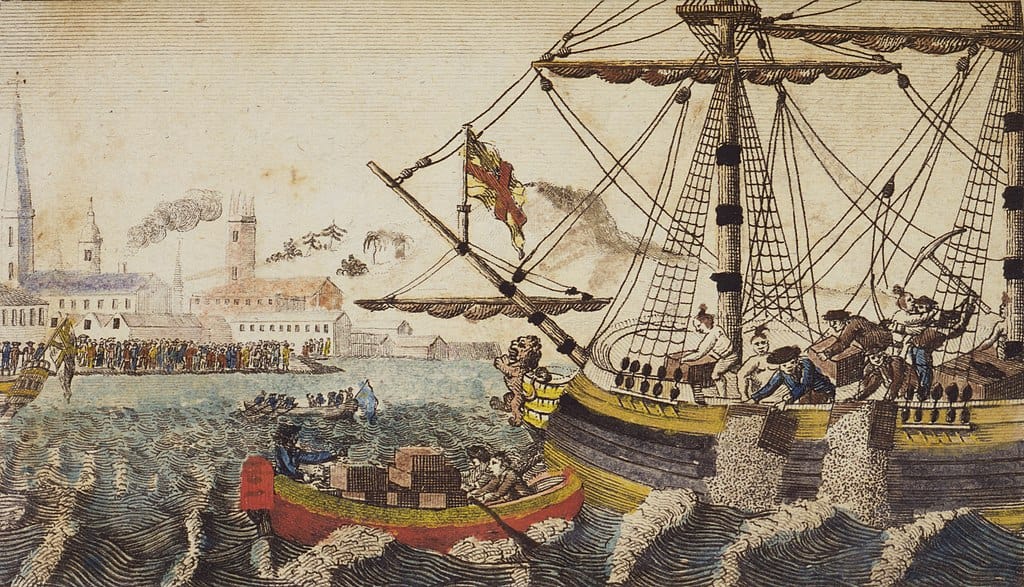
The Intolerable Acts were a set of punitive regulations imposed by the British Parliament in the aftermath of the Boston Tea Party in 1774. The measures were intended to retaliate against the colonists of Massachusetts for their obstinacy during the Tea Party protests against the Tea Act, a tax bill passed by Parliament in May 1773. This legislation was known as the Coercive Acts in Great Britain. They were a crucial development that resulted in the American Revolutionary War breaking out in April 1775.
BACKGROUND
- Following the French and Indian War, Parliament tried to impose taxes on the colonies, such as the Stamp Act and Townshend Acts, to help pay for the expense of upholding the empire. To help the ailing British East India Company, Parliament approved the Tea Act on 10 May 1773.
- The business had to sell its tea through London to avoid paying taxes and tariffs before the law was passed. The corporation would be able to sell tea straight to the colonies without incurring any additional fees according to the new regulations. As a consequence, just the Townshend tea duty would be levied, which would lower tea costs in America.
- The Townshend Acts imposed taxes on a variety of goods, including glass, lead, paint, paper and tea.
- The colonies responded to these taxes with widespread protests and boycotts of British goods.
- The Sons of Liberty, led by figures such as Samuel Adams and Paul Revere, organised and led many of these protests and boycotts.
- The Tea Act of 1773, which gave the East India Company a monopoly on tea sales in the colonies, further angered the colonists and was seen as a further infringement on their rights and freedoms.
- The Boston Tea Party, in which colonists disguised as Native Americans boarded ships and threw 342 chests of tea into the Boston Harbor, was a direct result of these tensions and the colonists’ opposition to the Tea Act.
- This event further escalated tensions between the colonies and Britain, ultimately leading to the American Revolution.
- The colonies also started to develop their own domestic tea industry.
- The British government response to the Boston Tea Party with a series of Coercive Acts, which further inflamed tensions and solidified many colonists’ desire for independence.
- The colonists were upset by this. In January 1774, word of the Boston Tea Party reached England. Four statutes were enacted by Parliament in response. Three of the legislative acts had Massachusetts’ punishment as their primary goal. This was done to destroy private property, take back control of Massachusetts for the British, and change other aspects of colonial rule in America.
THE ACTS
- The Boston Port Act closed the port of Boston to all ships, effectively crippling the city’s economy.
- The Massachusetts Government Act greatly limited the powers of the colony’s government, making it more difficult for the colonists to resist British rule.
- The Administration of Justice Act allowed royal officials accused of crimes in Massachusetts to be tried in England, rather than by a jury of their peers in the colony.
- The Quartering Act required colonists to provide housing and supplies for British troops.
- The Quebec Act extended the boundaries of the Province of Quebec southwards to the Ohio River and westwards to the Mississippi River, and guaranteed freedom of worship for Catholics in the colony.
BOSTON PORT ACT
- The Boston Port Act was one of the five laws known as the Intolerable Acts passed by the British government in response to the Boston Tea Party. The act was passed on 30 March 1774, and was an immediate response to the city’s Tea Party in November of the previous year. The law required that the port of Boston be blocked to all commerce until the King and the East India Company received full compensation for the lost taxes and tea. This meant that the city would no longer be able to import or export goods, causing a severe economic impact on the city and its residents.
- The ordinance also stipulated that Marblehead would become an entrance port and Salem would become the colony’s new seat of administration. This was a direct attempt to punish the city of Boston for the Tea Party and to assert greater control over the colonies. Many Bostonians, especially Loyalists, vociferously objected to this legislation, arguing that the entire city should not be punished for the actions of a few individuals.
- As the city’s resources ran out, neighbouring colonies started delivering aid to the blockaded metropolis. The Boston Port Act was seen as an infringement on the colonists’ rights and an abuse of power by the British government and it would go on to play a significant role in the lead-up to the American Revolution. The act was repealed in 1774.
MASSACHUSETTS GOVERNMENT ACT
- The Massachusetts Government Act, passed on 20 May 1774, was intended to strengthen royal control over the colony’s governance. The legislation revoked the colony’s charter and established that the monarch would pick the members of the executive council, which would no longer be freely elected. This meant that the British government would have more control over the colony’s government, and the colonists would have less representation and control over their own governance.
- Additionally, the royal governor would now appoint officials to several colonial posts that had previously been filled by elected authorities. This further increased the power of the British government over the colony and reduced the power of the colonists. Only one town assembly was allowed every year in the whole colony, barring governor approval. This restriction on the colonists’ ability to gather and make decisions further eroded their rights and autonomy.
- Patriots across the colony organised the Massachusetts Provincial Congress in response to General Thomas Gage’s use of the act to dissolve the provincial assembly in October 1774. This body essentially ruled over all of Massachusetts outside of Boston. The Massachusetts Government Act was seen as a violation of the colonists’ rights and an abuse of power by the British government and it would go on to play a significant role in the lead-up to the American Revolution.
ADMINISTRATION OF JUSTICE ACT
- The Administration of Justice Act, which was passed on the same day as the preceding act, the Massachusetts Government Act, provided that if charged with illegal conduct while carrying out their responsibilities, royal officials might ask for a change of venue to another colony or Great Britain. This meant that if a royal official was accused of a crime in Massachusetts, they could request to be tried in another colony or in Great Britain, instead of by a jury of their peers in the colony where the crime was committed. This would make it much more difficult for the colonists to hold royal officials accountable for their actions.
- Despite the fact that the statute provided for witnesses’ travel costs to be covered, few colonists could afford to take time out of work to testify in court. This further reduced the likelihood of royal officials being held accountable for their actions. Many colonists believed this act was unnecessary because British soldiers had already been given a fair trial in the wake of the Boston Massacre. They saw this act as an attempt to protect royal officials from facing consequences for their actions.
- Some referred to it as the ‘Murder Act’ because they believed it gave royal officials a pass to commit crimes without facing consequences and then flee the country. The Administration of Justice Act was seen as a violation of the colonists’ rights and an abuse of power by the British government and it would go on to play a significant role in the lead-up to the American Revolution.
QUARTERING ACT
- The 1774 Quartering Act was a reform to the 1765 Quartering Act, which abolished the need that troops be furnished with supplies and extended the sorts of houses in which they might be billeted. The 1765 Quartering Act required the colonies to provide food, drink and lodging for British troops stationed in the colonies.
- The new 1774 Quartering Act, however, gave British authorities the power to quarter troops in any building, including private homes, taverns and warehouses, if barracks or public buildings were deemed inadequate. This was seen as a violation of colonists’ rights and an infringement on their property.
- The 1765 Quartering Act was widely disregarded by provincial legislatures, and the 1774 Quartering Act was meant to enforce it more strictly. The Quartering Act was seen as a violation of the colonists’ rights and an abuse of power by the British government and it would go on to play a significant role in the lead-up to the American Revolution.
- Contrary to common misconception, it did not allow for army accommodation in private residences.
- Soldiers were often first accommodated in existing barracks and public buildings, but they were also occasionally allowed to stay in hotels, victualing houses, vacant buildings, barns, and other unused facilities.
- However, the provision of the act that allowed troops to be quartered in private homes with the owner’s consent, if public accommodations were deemed inadequate, was seen as particularly offensive by many colonists.
QUEBEC ACT
- The Quebec Act was regarded by the American colonists as one of the Intolerable Acts even though it had no direct bearing on the 13 colonies. The legislation was passed in 1774 to increase the bounds of Quebec and secure the allegiance of the King’s Canadian subjects. The act extended the boundaries of the Province of Quebec southwards to the Ohio River and westwards to the Mississippi River, which included much of the Ohio Country. This was land that had been promised to numerous colonies through their charters and to which many colonists had previously made claims.
- The expansion of Quebec’s territory was seen by the American colonists as a violation of their rights and an infringement on their land claims. This expansion also included land that many colonists had already settled on and claimed as their own. This caused great resentment among the colonists and further fuelled their opposition to British rule.
- In addition to offending land speculators, there was also concern about the expansion of Catholicism in America. The Quebec Act also permitted the free exercise of the Catholic faith in Quebec, which was a cause of concern for many Protestant colonists who saw it as a threat to their religious freedom. The act was seen as an attempt by the British government to impose their own religion on the colonists, further increasing their resentment and opposition to British rule.
AFTERMATH
- Many colonists believed that the Coercive Acts (Intolerable Acts) were against their natural rights, colony charters, and their constitutional rights. They felt that these laws were unjust, arbitrary and unjustly targeted at Massachusetts, but also saw them as a threat to the rights of British America as a whole. The colonists believed that these acts were a violation of the rights and liberties that they had been promised as British subjects.
- A representative from Virginia named Richard Henry Lee, for instance, called the actions ‘a most wicked System for destroying the liberty of America.’ This sentiment was echoed by other colonists and leaders who saw the acts as an infringement on their rights and an abuse of power by the British government. The Coercive Acts were a significant factor in escalating tensions between the colonies and Great Britain, and would play a crucial role in the lead-up to the American Revolution.
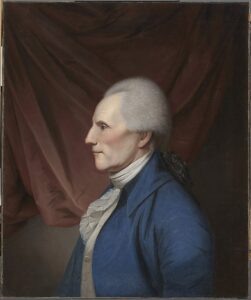
Richard Lee - The Coercive Acts, also known as the Intolerable Acts, were a series of laws passed by the British government in 1774 in response to the Boston Tea Party. These acts not only reinforced the already strong feelings of resentment and anger among the residents of Boston towards the British government, but they were also seen as a harsh and excessive form of punishment for the actions of a few individuals. Furthermore, the Intolerable Acts also served to unite the colonies in their opposition to British rule, as more and more colonies began to join the rebellion against the British control.
- The Intolerable Acts were intended by Great Britain to isolate radicals in Massachusetts and force American colonists to recognise the power of Parliament over their elected bodies.
- The severity of some of the legislation made it impossible for moderates in the colonies to support Parliament, therefore it was a calculated gamble that backfired.
- The acts did nothing more than separate the colonies from the Crown, foster pity for Massachusetts, and inspire people from the apparently disparate colonies to organise committees of correspondence that sent representatives to the First Continental Congress.
- The Continental Association, a decision to shun British products, was established by the Continental Congress.
- The Continental Congress passed a resolution of non-exportation agreement, where the colonies agreed to stop exporting goods to Great Britain until the Coercive Acts were repealed to put pressure on the British government to repeal the Coercive Acts and recognise the colonies’ rights.
- The Congress also promised to defend Massachusetts in the event of an assault involving all the colonies, uniting colonies in their resistance to British rule and serving as a rallying cry for the colonies to defend themselves against British aggression. This led to the American Revolutionary War, which officially began on 19 April 1775 with the Battles of Lexington and Concord as a direct result of the Congress’s actions and the British government’s refusal to back down.

